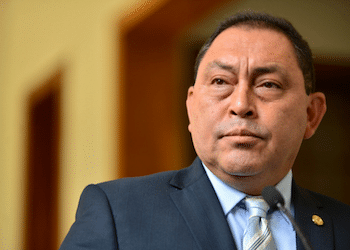In our June 29 Facebook Live session, Senior Editor Mike LaSusa and Senior Investigator Héctor Silva Ávalos discussed the case of former Guatemala Interior Minister Mauricio López Bonilla, who is being sought by the United States to face drug charges in a federal court.
The discussion began with LaSusa outlining the drug trafficking allegations against López Bonilla, which were made public by US authorities in February. This week, the United States formally requested López Bonilla’s extradtion from Guatemala, where he is currently jailed on separate charges.
Silva explained how López Bonilla’s military background exposed him to powerful players in Guatemala’s political scene, including former President Otto Pérez Molina and former Vice President Roxana Baldetti — under whose administration he served as interior minister — as well as another military veteran, Byron Lima, who was brought up later in the conversation.
LaSusa and Silva discussed the fact that López Bonilla had been considered a key US partner in the fight against organized crime in the region during his time as interior minister from 2012 to 2015. In that position, López Bonilla was in charge of overseeing both the police and the prison system.
SEE ALSO: Guatemala’s Mafia State and the Case of Mauricio López Bonilla
Silva pointed out that the US relationship with López Bonilla fits a longstanding pattern of the United States working with questionable partners on anti-drug efforts in Central America. As an example, he mentioned the case of the late Panamanian dictator Manuel Noriega, who worked with US authorities during the 1980s on counter-drug efforts until his own involvement in the drug trade became too blatant to ignore; he was ousted by a US invasion in 1989 and subsequently tried and jailed in the United States.
Silva also emphasized that, despite political rhetoric to the contrary, corrupt political networks comprised of high-level officials — many of whom enjoy US support, financial or otherwise — play a more important role in the drug trade in Central America than the violent gangs that also contribute significantly to security problems. As an example, he mentioned the US extradition request for former Guatemalan Vice President Baldetti, which alleged that she accepted bribes in exchange for assisting the drug trafficking activities of Mexico’s Zetas Cartel. (Like López Bonilla, Baldetti is also jailed in Guatemala on separate charges.)
Still, Silva explained, the US prosecution of López Bonilla and Baldetti likely will not have a major impact on the operations of organized crime in Guatemala. The International Commission against Impunity in Guatemala (Comisión Internacional contra la Impunidad en Guatemala – CICIG) has done important work to expose the depths of corruption in the country, he said, but “as long as the state has this illness, what the head of CICIG called ‘systemic corruption‘” organized crime will find space to operate.
LaSusa and Silva also discussed the significance of the case of Byron Lima, the former special forces soldier who became the “king” of Guatemala’s prison system after he was jailed in 2001 for his involvement in the 1998 murder of Bishop Juan José Gerardi.
SEE ALSO: Reign of the Kaibil: Guatemala’s Prisons Under Byron Lima
Lima was reportedly close with both ex-President Pérez Molina and ex-Interior Minister López Bonilla (though López Bonilla has denied this). According to an InSight Crime investigation, Lima had such power within the prison system that he felt comfortable suggesting candidates for top official positions to López Bonilla — yet another example of alleged criminal collusion at the highest levels of the Guatemalan “mafia state” that reigned during the Pérez Molina administration.
Watch the Facebook Live broadcast for the full conversation:

